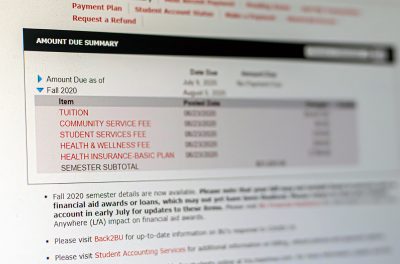
Fall 2020 will be unlike anything Boston University has experienced prior. One constant, however, is that students must pay tuition and fees before the semester begins.
As the Aug. 5 payment deadline approaches, The Daily Free Press has broken down what fees students will need to pay, where the money will go and how this year’s bill compares to last year’s.
Required fees and tuition will be the same for those learning on-campus and remotely, according to BU Spokesperson Colin Riley. He wrote in an email that the student fees were set before the pandemic began.
“We had calculated and set next year’s rates prior to the pandemic forcing us to remote teaching/learning,” Riley wrote. “Zoom is installed in every classroom and has associated scheduled maintenance costs.”
In April, University Provost Jean Morrison announced in an email that students would not be refunded for Spring 2020 tuition or mandatory fees. The money was reallocated to meet the needs of students learning remotely, Morrison wrote.
“While it is true that some services, activities, and programs for students have been curtailed due to the current COVID-19 situation,” Morrison wrote, “many health, wellness, and student support areas have required an influx of resources to address and mitigate the impact of COVID-19 on students, necessitating a reallocation of resources.”
Tuition
This year’s Fall tuition before financial aid is $28,427, up from $27,360 last year.
This is a 3.9 percent tuition increase, compared to the 2.2 percent inflation rate calculated with the Commonfund Higher Education Price Index. The HEPI is similar to the Consumer Price Index and is used to calculate the relative inflation rate for the goods and services purchased by universities.
Riley wrote in an email that tuition revenue covers half of BU’s budget.
“The University has not had an operating deficit in half a century and the administration is working hard to ensure the financial health of the University so there isn’t one going forward,” Riley wrote. “Boston University is a tuition-dependent university and tuition accounts for half of the University’s operating budget.”
Orientation Fee
All first-year students are required to attend Orientation. This year, students were required to pay $315 for a remote Orientation, while students paid $310 for last year’s in-person orientation.
Shiney James, director of Orientation, said the fee generally increases each year to account for inflation.
This year, James said, Orientation fees allowed the University to build a new orientation website, provide students free one-year access to student engagement site Yellowdig and employ more than 80 members of the Orientation team.
Students exhibiting financial need can waive the fee using a form on the Orientation webpage.
Community Service Fee
Students will pay a $62 Community Service Fee this Fall, $2 more than last Fall’s $60. Proceeds go toward student organizations, programs and services, according to Student Accounting Services.
Fee revenue may be spent in other ways depending on BU’s needs, Riley wrote.
Student Services Fee
This year’s Student Services Fee is $319, compared to last year’s $307. The fee pays for technology and student support services, according to Student Accounting Services.
BU Information Systems and Technology added Shindig, an online video conferencing service targeted at large groups, which Riley wrote will be used alongside Zoom.
Health & Wellness Fee
Students will pay a $228 Health and Wellness Fee this year. Last year, students paid $219. This fee offsets the cost of FitRec and Student Health Services, according to Student Accounting Services.
Health Insurance
BU requires that all full-time, three-quarter time and international students have health insurance, according to Student Accounting Services. Students are automatically enrolled in the Student Health Insurance Plan but can waive the fee if they have their own qualifying health insurance.
Students learning remotely will be required to have health insurance with coverage in their local area, according to Riley.
The Basic SHIP plan costs $2,789 and the Plus plan costs $3,719.
Residence Charge/Dining Plan
Students living on campus will pay the residence charge. Housing prices range from $5,495 per semester for a traditional-style double to $9,690 per semester for a one-student apartment.
BU requires students living in on-campus dorms and suites to purchase a dining plan, the cheapest rate being $2,825 per semester. Students living in on-campus apartments can purchase optional apartment dining plans for fewer meals at a reduced cost.
No Sports Pass this Year
BU usually includes the sports pass on students’ tuition bills, and students can choose to remove it. Last year, it cost $130.
The pass grants entry to any home ice hockey, basketball, lacrosse or soccer game.
Sports passes are not available for the Fall. The Patriot League, to which most BU varsity teams belong, had announced on July 13 the cancelation of all Fall competitions.




















































































































David Kuo • Aug 11, 2020 at 1:19 pm
06/23/2020 TUITION 28,427.00
07/27/2020 TUITION 3,554.00
so BU just added another $3554?